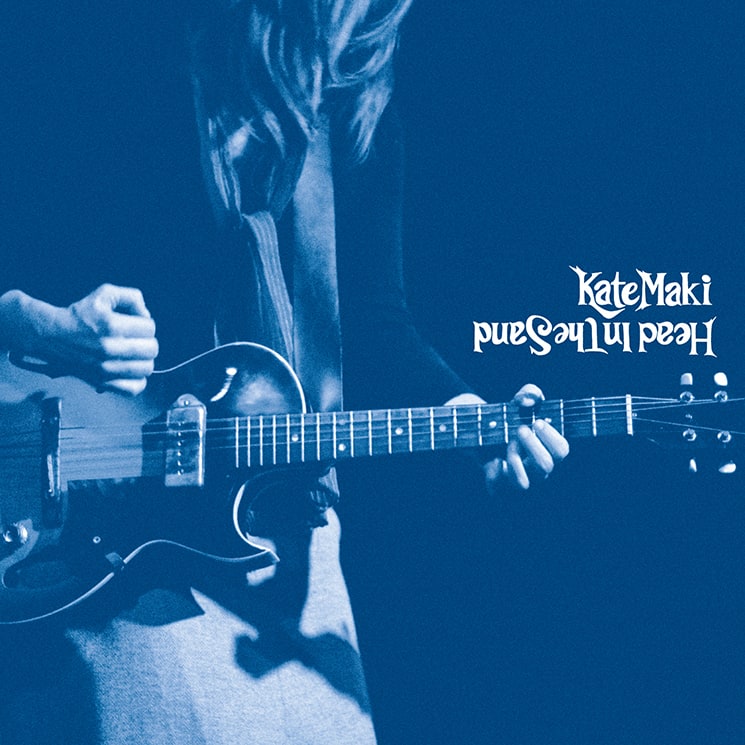Sudbury songwriter Kate Maki draws heavily from her own tumultuous past on Head in the Sand, her softly stirring sixth album. Here, she's playing songs that mostly date back to 2009, a truly tough year for her.
The reason it took so long for these songs to emerge had mostly to do with the pressures of juggling two small children, building a home studio in Copper Cliff (a historic mining neighbourhood in Sudbury, beside the smelter) and working a recording schedule around her husband Fred Squire's demanding studies (he's becoming a mechanical engineer). The resulting warm, spacious-sounding album, which has a sustained mood akin to being outdoors on a summer night, demonstrates a simplicity the couple worked hard to perfect, tinkering with analogue vintage equipment (including a '70s eight track tape machine, an '80s mixing console and some good borrowed mics) until they got the sounds just right.
And the sounds are just right: Maki actually stripped stuff away in the recording process, leaving only a few core components: her voice (which there's lots of), guitar, piano and organ, Squire on electric guitar, bass and a bit of drums and Maki's old friend and longtime collaborator Nathan Lawr on drums. This uncluttered palette calls attention to details: a bit of piano at the end of the title track, Lawr's sensitive, at times idiosyncratic drumming, and every note on the truly solo Maki tracks, "Before It Began" and "Let It Run."
Head in the Sand has a few surprises, too: the heavier, faster, psychedelic "September Sun" shows off an interesting folk rock side, while closer "Mother Ship" hints at calypso under Maki's suddenly more gravelly voice.
It's quietly powerful stuff. Maki takes us into her past — to songs of infidelity, uncertainty, transiency and loneliness — as a careful and calm observer of her past self and of universal emotions. "Is it right or is it left?" she asks on opener "Keep Right," but by playing things straight, Head in the Sand finds Maki at her most direct and affecting.
(Confusion Unlimited)The reason it took so long for these songs to emerge had mostly to do with the pressures of juggling two small children, building a home studio in Copper Cliff (a historic mining neighbourhood in Sudbury, beside the smelter) and working a recording schedule around her husband Fred Squire's demanding studies (he's becoming a mechanical engineer). The resulting warm, spacious-sounding album, which has a sustained mood akin to being outdoors on a summer night, demonstrates a simplicity the couple worked hard to perfect, tinkering with analogue vintage equipment (including a '70s eight track tape machine, an '80s mixing console and some good borrowed mics) until they got the sounds just right.
And the sounds are just right: Maki actually stripped stuff away in the recording process, leaving only a few core components: her voice (which there's lots of), guitar, piano and organ, Squire on electric guitar, bass and a bit of drums and Maki's old friend and longtime collaborator Nathan Lawr on drums. This uncluttered palette calls attention to details: a bit of piano at the end of the title track, Lawr's sensitive, at times idiosyncratic drumming, and every note on the truly solo Maki tracks, "Before It Began" and "Let It Run."
Head in the Sand has a few surprises, too: the heavier, faster, psychedelic "September Sun" shows off an interesting folk rock side, while closer "Mother Ship" hints at calypso under Maki's suddenly more gravelly voice.
It's quietly powerful stuff. Maki takes us into her past — to songs of infidelity, uncertainty, transiency and loneliness — as a careful and calm observer of her past self and of universal emotions. "Is it right or is it left?" she asks on opener "Keep Right," but by playing things straight, Head in the Sand finds Maki at her most direct and affecting.
